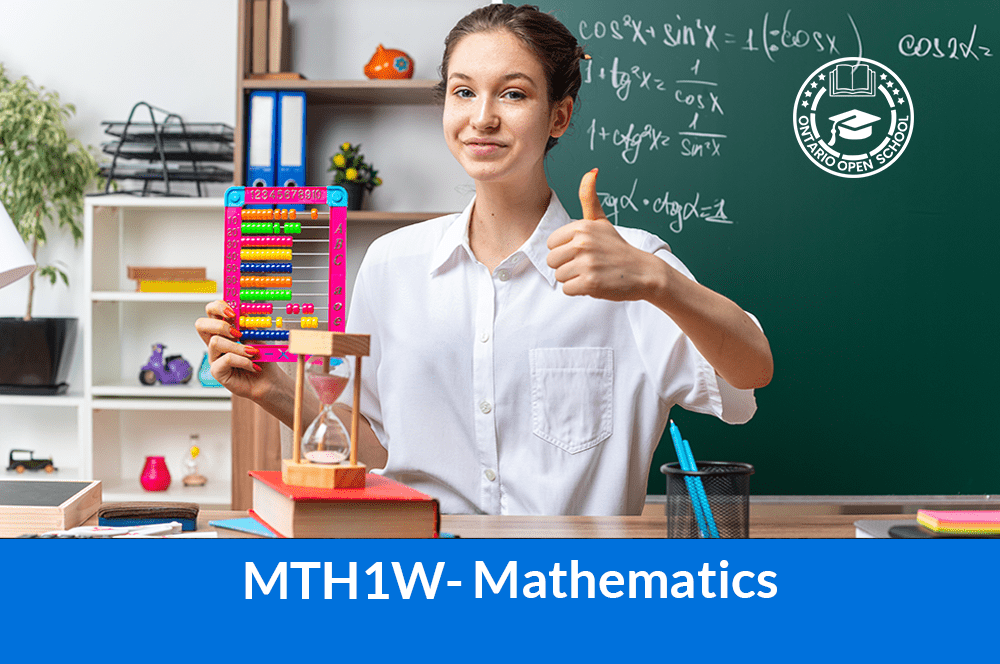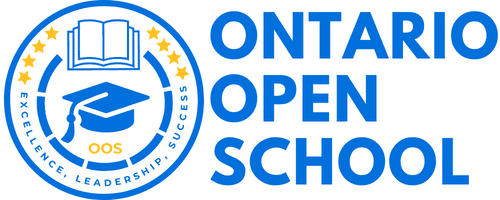- info@ontarioopenschool.com
- 647-494-4499
-
Unit 100 - 29 Gervais Drive, North York, ON.
M3C 1Y9
Copyright 2024 Ontario Open School Inc. All Rights Reserved.
This course enables students to develop an understanding of mathematical concepts related to algebra, analytic geometry, and measurement and geometry through investigation, the effective use of technology, and abstract reasoning. Students will investigate relationships, which they will then generalize as equations of lines, and will determine the connections between different representations of a linear relation. They will also explore relationships that emerge from the measurement of three-dimensional figures and two-dimensional shapes. Students will reason mathematically and communicate their thoughts as they solve multi-step problems.
Unit Order | Unit Name | Suggested Time |
|---|---|---|
| AA | Social-Emotional Learning (SEL) Skills in Mathematics | Throughout the Course |
| A | Mathematical Thinking and Making Connections | Throughout the Course |
| Unit 1 | Unit 1: Numbers This unit will expand on the use of fractions, ratios, rates, proportions, and number sets, as well as introduce the rules for working with exponents. Students will also be introduced to abstract concepts like infinite sets and limits of a pattern. | 18 hours |
| Unit 2 | Unit 2: Algebra This unit will focus on setting the foundations for working with linear relationships. Students will solve various algebraic equations and get familiarized with linear and non-linear expressions. | 15 hours |
| Unit 3 | Unit 3: Data This unit will expand on the foundations of data collection and data analysis and build toward a project where students conduct a survey and analyze their data. Students will create a mathematical model for their data and test its validity. | 18 hours |
| Unit 4 | Unit 4: Linear and Non-Linear Relations This unit is a follow up on unit 2 where students will investigate the properties of linear and non-linear relationships, the different representations of linear relationships, and solve theoretical and application problems involving linear relationships. | 18 hours |
| Final Evaluation | Final Project Final Exam | 8 hours 2 hours |
| Total | 110 hours |
A variety of strategies are used to allow students many opportunities to attain the necessary skills for success in this course. The teacher uses a variety of whole class, small group and individual activities to facilitate learning. The following is a list of specific teaching/learning strategies that the teacher may use but is not limited to:
|
Oral Presentation Discussion Socratic Lesson Independent Study Research Process Computer Assisted Instruction |
Think Pair Share
Visual Stimuli Note Making Scientific Method Media Presentation |
Reflective discussion Lecture Worksheet Inquiry Process Brainstorming |
Purpose
The primary purpose of assessment is to improve student learning. Assessment relates directly to the expectations for the course.
A variety of assessments for and as learning are conducted on a regular basis to allow ample opportunities for students to improve and ultimately demonstrate their full range of learning and for the teacher to gather information to provide feedback. Assessment tasks relate to the success criteria set out in lesson plans. Success criteria allow students to see what quality looks like.
Evaluation is the process of judging the quality of student work in relation to the achievement chart categories and criteria and assigning a percentage grade to represent that quality. Evaluation is based on gathering evidence of student achievement through:
Assessment for Learning – we provide feedback and coaching. Assessment FOR Learning is the process of seeking and interpreting evidence for the use of learners and their teachers to decide where the learners are in their learning, where they need to go, and how best to go there.
Assessment as Learning – we help students monitor progress, set goals, reflect on their learning
Assessment AS Learning is the process of the explicit fostering of students’ capacity over time to be their own best assessors, but teachers need to start by presenting and modeling external, structured opportunities for students to assess themselves.
Assessment of Learning – we use assessments to provide evaluative statements about student achievement. Assessment OF Learning is the assessment that becomes public and results in statements of symbols
(marks/grades/levels of achievement) about how well students are learning. It often contributes to pivotal decisions that will affect students’ future.
ASSESSMENT TOOLS
|
Success Criteria check list at the end of each chapter (self-assessment) |
|
Journal |
|
Assignment |
|
Unit Test |
|
Worksheet |
|
Self-check Quiz |
| Strand | Duration | Overall Expectations | AFL | AAL | AOL | K
25% |
A
25% |
C
25% |
T
25% |
||
| A and AA | AA1
A1-A2 |
Throughout the Course | |||||||||
|
70% |
B | 20 hours | B1-B3 | Discussion
Worksheet Exit Card
|
3-2-1 Exit Card
Success Criteria Checklist Peer Discussion Self-check Quiz |
Discussion
Assignment Test Presentation |
√ | √ | √ | √ | |
| C | 35 hours | C1-C4 | Discussion
Worksheet Exit Card Quiz |
3-2-1 Exit Card
Success Criteria Checklist Peer Discussion Self-check Quiz |
Discussion
Assignments Test Journal
|
√ | √ | √ | √ | ||
| D | 20 hours | D1-D2 | Discussion
Worksheet Exit Card
|
3-2-1 Exit Card
Success Criteria Checklist Peer Discussion |
Assignments
Culminating Task |
√ | √ | √ | √ | ||
| E | 20 hours | E1 | Worksheet
Exit Card Homework |
Exit Card
Success Criteria Checklist Peer Discussion |
Assignment
Performance Task
|
√ | √ | √ | √ | ||
| F | 15 hours | F1 | Homework
Exit Card |
SEL Checklist
Discussion Homework |
Assignment
|
√ | √ | √ | √ | ||
| 30% | A1-F1 | My Math Portfolio (10%)
Final Exam 20% |
√ |
√ |
√ |
√
|
|||||
Resources
Growing Success: Assessment, Evaluation and Reporting in Ontario Schools (2010)
http://www.edu.gov.on.ca/eng/policyfunding/growSuccess.pdf
Growing Success Documents, Ministry of Education, 2010.
Principles of Mathematics 9 (Nelson Education Ltd., 2010).
Principles of Mathematics 9 (McGraw-Hill Ryerson, 2007).
Moodle Website
Grading
Weighting of categories
| Knowledge/Understanding | Thinking/Inquiry | Communication | Application |
| 25% | 25% | 25% | 25% |

Course Grade | Grade 9 |
|---|---|
Course Code | MTH1W |
Course Category | Mathematics |
Course Type | De-Streamed |
Course Delivery | Online |
Course Duration | 8hrs |
Course Credit | 0 |
Copyright 2024 Ontario Open School Inc. All Rights Reserved.
